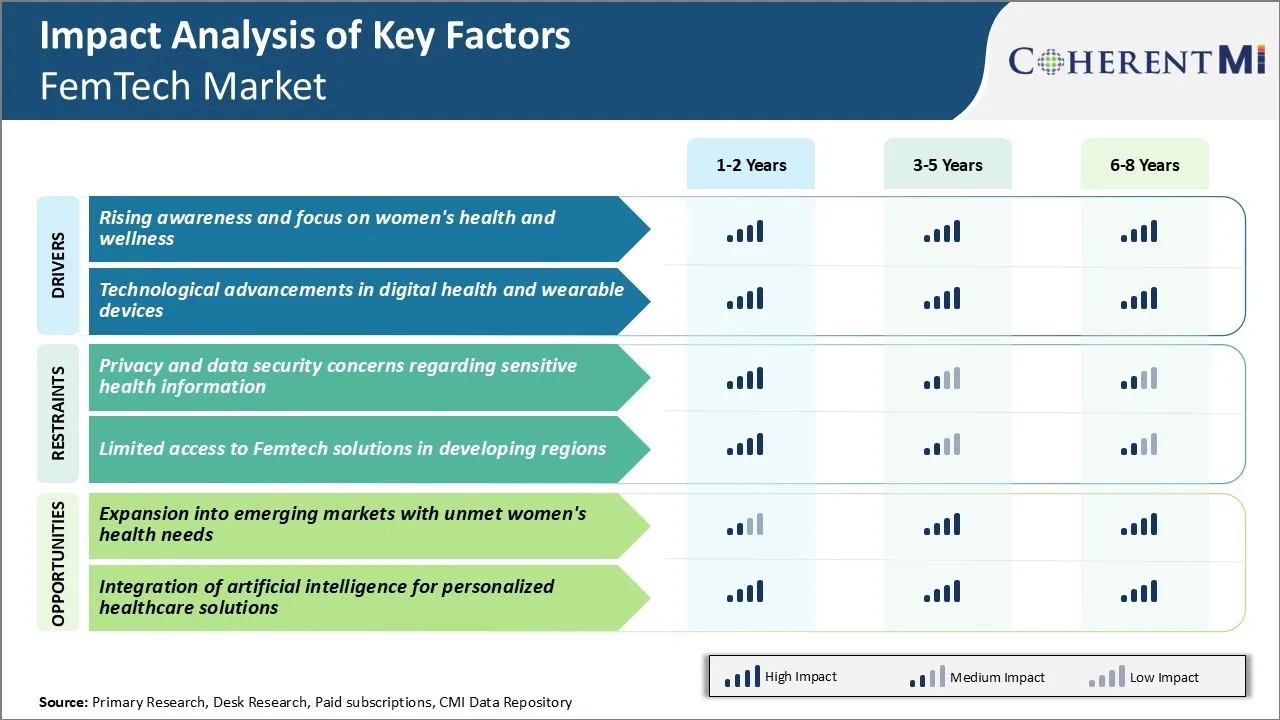FemTech Market Trends
Market Driver - Rising Awareness and Focus on Women's Health and Wellness
There has been a significant rise in awareness about women's health and well-being in recent years. Issues like pregnancy, fertility, menstrual health that were once considered private topics are now being openly discussed. Many women now recognize how their lifestyle choices like stress, diet, exercise impact their wellness and are taking active measures to monitor vital signs, track cycles and catch any anomalies early. This has boosted demand for FemTech solutions that provide personalized insights and support concerning hormones, fertility, pregnancy and more.
Additionally, mainstreaming of feminism and girl power movements have encouraged women to prioritize self-care over other responsibilities. This has shifted focus from curing diseases to also addressing social, emotional and mental causes of suboptimal wellness. FemTech caters to this rising consumer preference for monitoring general well-being not just symptoms of disorders.
In all, higher health-consciousness among women driven by widely accessible information and inspiration from role models has generated demand for technology assisting the feminine experience with health from menarche to menopause in a supportive and caring manner. This works as a key driver propelling the FemTech industry and aids in tackling problems uniquely relevant to women through digital solutions.
Market Driver - Technological Advancements in Digital Health and Wearable Devices
Over the past decade, wearable technology field has seen tremendous growth owing to widespread adoption of smartwatches and fitness trackers. These devices have transitioned from mere novelty toys to clinically validated tools gathering medical-grade data.
Popular health and lifestyle brands have ventured into this space with their expertise in formulating devices consumers love to use. This confers a feel of reliability to these products which are often associated with sensitive topics. Their strategic tie-ups with medical institutes yield clinically backed features reassuring anxious buyers.
Consumer electronics focused companies are leveraging on ubiquitous connectivity and cloud capabilities to add remote monitoring dimensions extending the capability of products. This paves way for virtual consultations, group therapies and peer learning on apps solving the lack of personalized guidance some women face otherwise. Nurturing community support is crucial for conditions involving mental stresses like infertility, pregnancy loss or dysmenorrhea.
Overall, convergence of digital health, machine learning and user experience innovation has equipped FemTech founders to tackle female wellness challenges holistically through non-invasive means. Tech-savvy millennials globally have enthusiastically endorsed these solutions seeking relief from discreetly tracking issues like endometriosis, menopause symptoms or breastfeeding patterns in public.

Market Challenge - Privacy and Data Security Concerns Regarding Sensitive Health Information
FemTech applications collect highly sensitive personal health data about women, such as menstrual cycle tracking, fertility status, and symptoms. There are real concerns amongst potential users about how this intimate data could be used, shared or exposed through a data breach.
Building trust that health data will remain private and secure is crucial for the market's growth but challenging to achieve. Regulatory frameworks around data privacy and health data are still developing in many countries. FemTech companies must prioritize privacy and transparency in their data handling practices to reassure consumers that their sensitive information is protected.
Earning and maintaining users' trust on privacy risks being an ongoing challenge as new applications emerge and data risks evolve over time. Without adequate privacy protections, many women may choose not to adopt FemTech products at all, limiting the size of the available market.
Market Opportunity - Expansion into Emerging Markets with Unmet Women's Health Needs
Many regions worldwide still have inadequate access to women's healthcare services and information. FemTech applications have strong potential to fill gaps and improve women's health in developing markets. Mobile-based FemTech could reach women in remote or underserved areas without sufficient medical facilities or advice.
Features like period trackers, fertility monitors, and symptom checkers may be especially beneficial. These emerging markets represent a major opportunity for FemTech's growth, as infrastructure and economic development spreads mobile connectivity. Localizing products for cultural appropriateness and language will be important to successfully enter new regions.
Partnering with women's health organizations could assist marketing and distribution into areas with great need but limited previous exposure to such technologies. Overall, expansion into emerging markets with unmet women's health needs presents a substantial opportunity for FemTech to positively impact global public health.